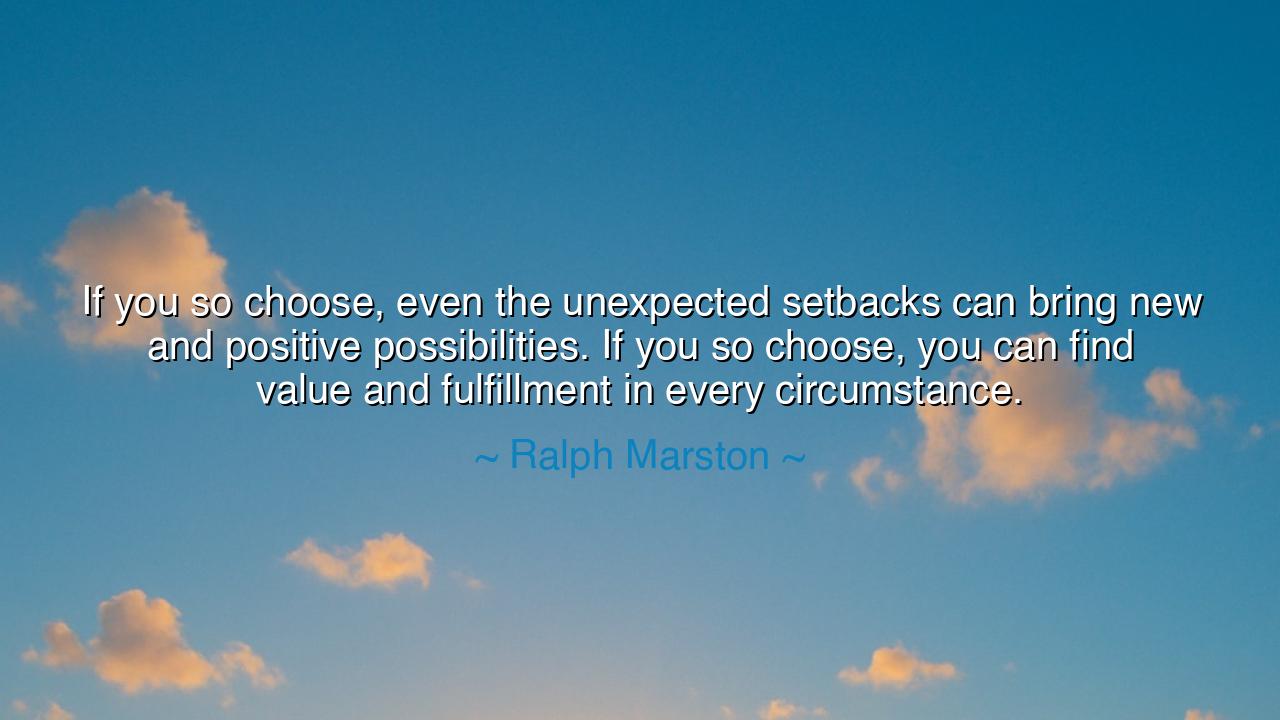
If you so choose, even the unexpected setbacks can bring new and
If you so choose, even the unexpected setbacks can bring new and positive possibilities. If you so choose, you can find value and fulfillment in every circumstance.






The words of Ralph Marston—“If you so choose, even the unexpected setbacks can bring new and positive possibilities. If you so choose, you can find value and fulfillment in every circumstance.”—carry the voice of timeless wisdom. They remind us that life is not ruled solely by events, but by the choices of the heart. Setbacks will come to every soul, as surely as storms to the sea. Yet Marston declares that even these storms can carry hidden treasures, if only we decide to see them not as ruin, but as the forging fires of growth.
The origin of such thought lies deep in the teachings of both East and West. The Stoics of ancient Rome, like Marcus Aurelius, taught that the obstacle is not only an enemy but a teacher, shaping the soul to endurance. Likewise, in Eastern philosophy, the Tao teaches that the crooked path may yet be the truest way, and what appears as misfortune may unfold into blessing. Marston’s words continue this ancient lineage: that possibility and fulfillment lie not in the absence of difficulty, but in the perspective we bring to it.
Consider the story of Thomas Edison, who faced thousands of failed experiments before perfecting the electric light. To most, each failure would have seemed a devastating setback. Yet Edison himself said, “I have not failed. I’ve just found 10,000 ways that won’t work.” His decision to view failure as learning transformed defeat into progress, and through his persistence, he brought light to the modern world. Here we see Marston’s words embodied: setbacks became the very source of achievement, because he chose to see them as such.
This teaching also speaks to the condition of the human spirit when faced with suffering. One may lose wealth, health, or reputation, yet still retain the power of choice—the power to decide what meaning will be made from hardship. Viktor Frankl, enduring the concentration camps of the Second World War, discovered that even in the midst of unspeakable pain, one could find value in service, in dignity, in inner freedom. His life proclaims that fulfillment is not destroyed by circumstance, but revealed through how one meets it.
Yet let us not mistake Marston’s words as easy optimism. To find positive possibilities in adversity requires effort, discipline, and courage. It is not the natural path of the heart to rejoice in difficulty, but the chosen path of the wise. One must train the mind daily, like a warrior training his arm, to seek lessons rather than complaints, opportunities rather than despair. This is the work of the spirit: to transform what seems like an end into the seed of a new beginning.
The lesson for us is clear: when setbacks come—and they surely will—do not see them as final tombstones, but as altars upon which new possibilities may be built. Ask yourself in hardship: what can be learned? What strength can be forged? What new path lies hidden within this closed door? In so doing, you transform adversity into ally, and sorrow into strength.
So, dear listener, take Marston’s words as a call to arms for your spirit. In every circumstance, choose to find value and fulfillment, not by denying pain, but by rising above it. Choose to see beyond the immediate wound into the larger horizon of possibility. For the truth is eternal: while we cannot command the winds of fate, we can command the sails of our soul. And with that choice, every storm, every setback, becomes not an end, but the beginning of a greater journey.






KVTran Khanh Vy
This quote sparks curiosity about the intersection of choice, perception, and circumstance. If we can choose to see setbacks as opportunities, how do we train ourselves to do so consistently? Are there examples from history or personal stories where people turned severe setbacks into profound growth? It also makes me question whether this philosophy works better in certain cultures or environments, or if it’s universally applicable regardless of context.
DQDung Quoc
I find myself wondering about the psychological mechanisms behind this perspective. Does seeing value in every circumstance improve mental health outcomes, or could it lead to over-analysis and stress? How can people cultivate the ability to choose positivity without feeling pressure to always find a silver lining? I’d like to explore whether research in positive psychology or resilience studies supports this approach and how it might be practically implemented.
AMAnh Mai
This idea resonates with me but also prompts skepticism. While reframing setbacks can lead to growth, does emphasizing choice risk ignoring the genuine pain of certain experiences? How do we differentiate between empowering mindset shifts and toxic positivity that dismisses valid struggles? I’m interested in exploring how to apply this philosophy in a grounded way that honors real challenges while still seeking potential benefits.
XNNguyen Ngo Xuan Nhi
Reading this, I feel motivated to reconsider how I approach challenges. It implies that setbacks are not just obstacles but potential gateways to growth. Yet I wonder about societal factors: can everyone truly access positive possibilities equally, or do systemic barriers limit some people’s ability to benefit from setbacks? How do we balance optimism with realism, especially when external factors make resilience harder to achieve?
DTnguyen dang trong
This quote makes me reflect on the role of personal agency in shaping one’s experience. If value and fulfillment can be found in any circumstance, what practical steps can someone take to cultivate this perspective? Does it require meditation, journaling, or conscious reframing, or is it more about an innate mindset? I’m curious whether this approach can be taught systematically or if it relies on individual temperament and life experience.